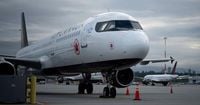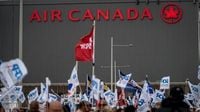For more than half a million travelers, the past week has been a whirlwind of canceled plans, missed connections, and mounting frustration as Air Canada faced its first major flight attendant strike since the 1980s. The dispute, which began on August 16, 2025, after months of failed negotiations, saw the airline ground flights across its global network, stranding passengers and exposing deep rifts between management and the union representing more than 10,000 cabin crew members.
Early Tuesday, a tentative agreement was finally reached between Air Canada and the Canadian Union of Public Employees (CUPE), as both sides confirmed in statements to the press. According to CBC News, the breakthrough came after nine hours of intensive talks brokered by William Kaplan, the federal government’s chief mediator. The deal, which still requires ratification by CUPE’s membership, promises to address one of the most contentious issues: pay for work performed while planes are on the ground.
"Unpaid work is over," CUPE announced in a statement provided to CBC News, signaling a significant win for flight attendants who have long argued that time spent preparing cabins, boarding passengers, and handling ground operations was unfairly uncompensated. The union instructed members to "fully co-operate with resumption of operations," a move that sets the stage for flights to gradually return, beginning Tuesday evening.
Yet, as Air Canada’s president and CEO, Michael Rousseau, cautioned, the road back to normalcy will be anything but smooth. "Everyone at Air Canada is doing everything possible to enable them to travel soon," Rousseau said, but full restoration of service "may require a week or more." The airline, which operates around 700 flights daily, estimated that up to 500,000 customers had been affected by cancellations since the crisis began. As The Independent noted, Air Canada flies about 130,000 passengers per day in August, including more than 5,000 between the UK and Canada alone.
The dispute’s origins stretch back to March 31, 2025, when the previous collective bargaining agreement expired. After eight months of fruitless negotiations, CUPE served a 72-hour strike notice on August 13. By Thursday, August 14, Air Canada began grounding flights in anticipation of the walkout. The strike officially commenced early Saturday, August 16, and by that afternoon, the airline had imposed a complete cessation of flying. The Canadian government quickly intervened, ordering binding arbitration through the Canada Industrial Relations Board (CIRB) and instructing cabin crew to return to work. However, CUPE rejected the order, accusing Air Canada of "anticipating such an intervention and not bargaining in good faith," according to CBC News.
The CIRB declared the union’s defiance "unlawful," but CUPE’s national president, Mark Hancock, was undeterred. "We will not be returning to the skies," Hancock told reporters, adding, "If it means folks like me going to jail, then so be it. If it means our union being fined, then so be it. We’re looking for a solution here. Our members want a solution here, but solution has to be found at the bargaining table." The union’s resolve was echoed in a near-unanimous strike vote, with 99.7% of members backing the action for better pay and recognition of ground duties.
Air Canada’s most recent offer, according to The Independent and NBC New York, included a 38% increase in total compensation over four years. The airline argued this would make its flight attendants "the best compensated in Canada." But union leaders dismissed the proposal as inadequate, especially given inflation and rising living costs. "With respect to Air Canada’s latest offer: it is below inflation, below market value, below minimum wage," CUPE stated. Candace Rennick, the union’s national secretary and treasurer, described Air Canada as a "wildly profitable employer" whose predominantly female workforce was "having to fight tooth and nail for a path out of poverty."
For passengers, the impact was immediate and severe. By Monday, August 18, aviation analytics firm Cirium reported that Air Canada had canceled at least 1,219 domestic and 1,339 international flights since the previous Thursday. Many travelers found themselves stranded far from home, with limited options for rebooking. British travelers, in particular, faced exorbitant costs for alternative routes. The Dearing and Robinson families from East Yorkshire, for example, were told by Air Canada, "We’re very sorry but after searching for flights on over 120 airlines for three days before and after your cancelled flights, we’ve been unable to rebook you." They ultimately secured flights via Seattle at double their original fare, as recounted to The Independent.
Montreal resident Robert Brzymowski shared his ordeal with NBC New York, describing how he, his wife, and their two children were stranded in Prague after their return flight was canceled. "I wasn’t planning on losing my job over vacation," he said, explaining that he missed the start of a new job and his children would miss their first day of school. Frustrated by what he called a lack of communication from Air Canada, Brzymowski said, "I, for one, will never fly Air Canada again. I’ll take a boat if I have to."
Air Canada’s response to affected customers has varied depending on their location. Passengers departing from the UK or EU are entitled to compensation and care under European regulations, including rebooking on other airlines and hotel accommodations if necessary. However, Canadian regulations exclude compensation for labor disruptions, leaving many travelers with little recourse beyond a refund or a long wait for an available seat. As The Independent explained, Air Canada is "telling many travellers that they should cancel and take a refund – leaving them high and dry to find and pay for a replacement flight." The financial toll on the airline has been steep, with losses estimated at C$50 million (about £27 million) per day during the strike, not to mention lasting reputational damage.
The dispute also reignited debate over the Canadian government’s use of legislation to curtail strikes and force arbitration, a step taken in recent years with workers at ports, railways, and now the airline sector. Jobs Minister Patty Hajdu announced a probe into CUPE’s allegations regarding unpaid ground work and suggested that new legislation could be on the horizon to address the issue. Prime Minister Mark Carney, for his part, urged both sides to resolve the conflict swiftly and stressed the need for fair compensation for flight attendants.
As flights begin to resume, travelers are advised to check their flight status before heading to the airport. Pearson Airport in Toronto has deployed extra staff to assist passengers and support the restart of operations. Air Canada has pledged to offer affected customers refunds, credits for future travel, or rebooking on other airlines where possible—though, as many have discovered, available seats are scarce during the busy summer season.
While the tentative agreement marks a turning point, the events of the past week have left scars on both the airline and its customers. For flight attendants, the deal represents hard-won recognition of their labor. For passengers, it’s a reminder of just how quickly travel plans can unravel—and how vital fair labor practices are to keeping the world moving.


